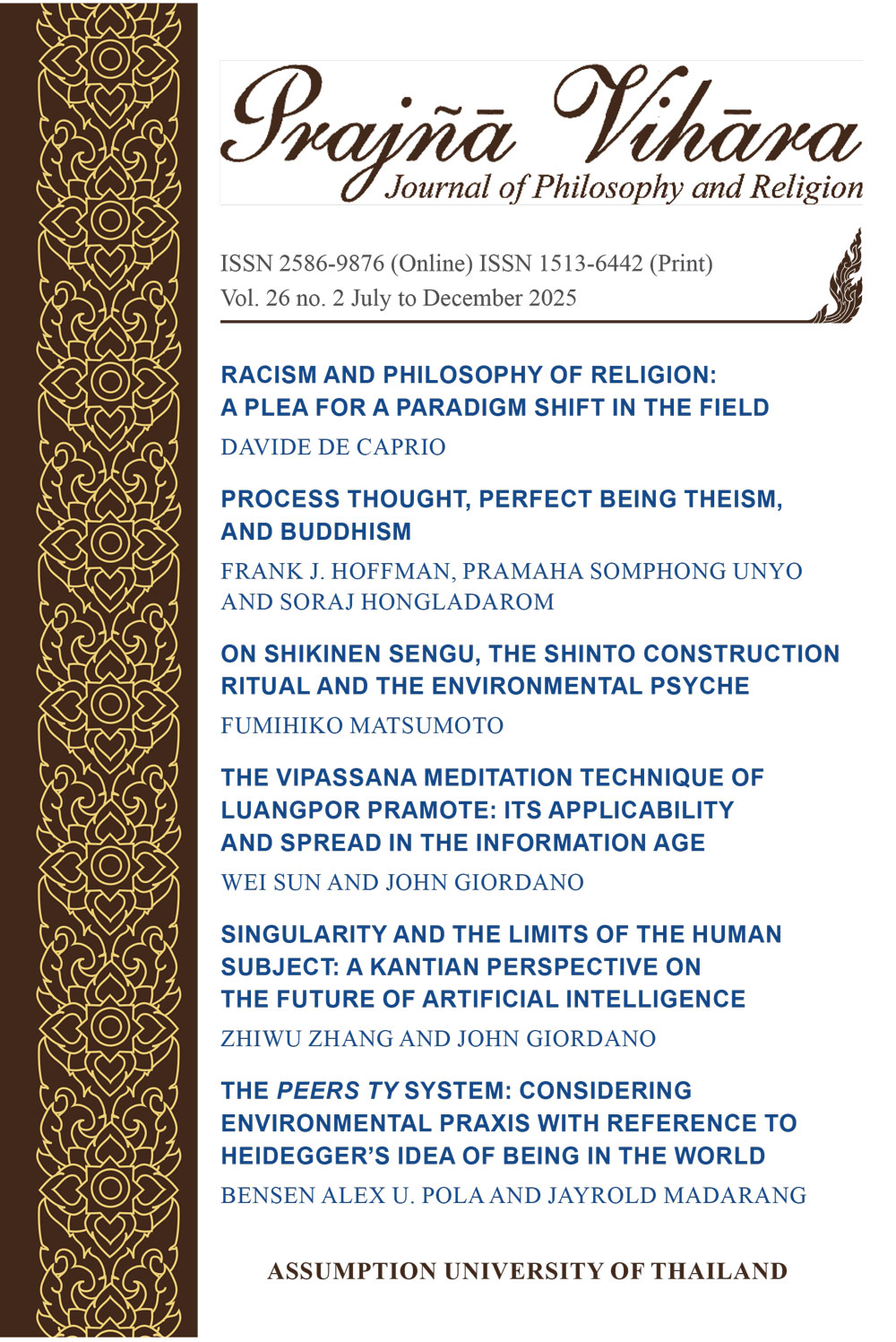SINGULARITY AND THE LIMITS OF THE HUMAN SUBJECT: A KANTIAN PERSPECTIVE ON THE FUTURE OF ARTIFICIAL INTELLIGENCE
Main Article Content
Abstract
This paper discusses the issue of technological singularity and analyzes its far-reaching impact on the future of mankind in combination with Kant's transcendental philosophy. Technological singularity is often understood as the point at which artificial intelligence surpasses human intelligence, leading to discussions about human free will, ethics, and social structures. However, this paper argues that technological singularity is not necessarily a threat, but a natural result of human reason and technological innovation. Using Kant's critical philosophy, this paper considers artificial intelligence from the perspective of human motivation, moral responsibility, and the limits of the human subject. This paper aims to provide a framework for philosophical reflection on the technological singularity in order to promote a deeper understanding of the relationship between technology and humanity.
Submitted: 03 June 2025
Accepted: 11 June 2025
Article Details
References
Ava Thomas Wright. “Rightful Machines.” Kant and Artificial Intelligence, edited by Hyeongjoo Kim and Dieter Schönecker, In De Gruyter eBooks, Walter de Gruyter GmbH & Co KG, 2022, 223–238.
Bateson, Gregory. Steps to an Ecology of Mind, University of Chicago Press, 2000.
Baiasu, Sorin. “The Challenge of (Self-) Consciousness: Kant, Artificial Intelligence and Sense-Making.” in Kant and Artificial Intelligence, edited by Hyeongjoo Kim and Dieter Schönecker, In De Gruyter eBooks, Walter de Gruyter GmbH & Co KG, 2022.
Berger, Larissa. “On the Subjective, Beauty and Artificial Intelligence: A Kantian Approach.” in Kant and Artificial Intelligence, edited by Hyeongjoo Kim and Dieter Schönecker, In De Gruyter eBooks, Walter de Gruyter GmbH & Co KG, 2022.
Birhane, Abeba. and Jelle van Dijk. “Robot rights? Let's talk about human welfare instead.” In AIES '20: Proceedings of the AAAI/ACM Conference on AI, Ethics, and Society. Association for Computing Machinery. 2020. p. 207-213. https://doi.org/10.1145/3375627.3375855.
Bostrom, Nick. Superintelligence: Paths, Dangers, Strategies. Oxford : Oxford University Press, 2013. https://archive.org/details/superintelligenc00unse/page/48/mode/2up?q=Vernor+Vinge
Dierksmeier, Claus. “Partners, Not Parts. Enhanced Autonomy Through Artificial Intelligence? A Kantian Perspective.” in Kant and Artificial Intelligence, edited by Hyeongjoo Kim and Dieter Schönecker, In De Gruyter eBooks, Walter de Gruyter GmbH & Co KG, 2022.
Danaher, John. “Why AI Doomsayers are Like Sceptical Theists and Why it Matters.” Minds & Machines 25, 2015, 231–246. https://doi.org/10.1007/s11023-015-9365-y.
Evans, Richard. “The Apperception Engine.” in Kant and Artificial Intelligence, edited by Hyeongjoo Kim and Dieter Schönecker, In De Gruyter eBooks, Walter de Gruyter GmbH & Co KG, 2022.
Gill, Karamjit S. “Artifictional Intelligence: Against Humanity’s Surrender to Computers.” AI & Society 34, no. 2 (January 2, 2019): 391–92. https://doi.org/10.1007/s00146-018-0873-1.
Heidegger. Martin. Being and time. New York: Harper Publishers, 1962.
Hyeongjoo, Kim and Dieter Schönecker. Kant and Artificial Intelligence. Walter de Gruyter GmbH & Co KG, 2022. https://doi.org/10.1515/9783110706611.
Hyeongjoo, Kim. “Tracing the Origins of Artificial Intelligence: A Kantian Response to McCarthy’s Call for Philosophical Help.” Kant and Artificial Intelligence, edited by Hyeongjoo Kim and Dieter Schönecker, In De Gruyter eBooks, Walter de Gruyter GmbH & Co KG, 2022.
Kant, Immanuel. Critique of Judgment. Translated W.S. Pluhar. Hackett, 1987.
_____. Critique of Practical Reason. Cambridge University Press, 1997.
_____. Critique of Pure Reason. Cambridge University Press, 1998.
_____. Critique of the Power of Judgment. Cambridge University Press, 2000.
_____. Groundwork for the Metaphysics of Morals (A. W. Wood, Trans.). Yale University Press. 2002 (Original work published 1785).
_____. Metaphysical Foundations of Natural Science. Cambridge University Press, 2004.
Lisa Benossi, and Sven Bernecker. “A Kantian Perspective on Robot Ethics.” in Kant and Artificial Intelligence, edited by Hyeongjoo Kim and Dieter Schönecker, In De Gruyter eBooks, Walter de Gruyter GmbH & Co KG, 2022.
McIlroy-Young, Reid, Siddhartha Sen, Jon Kleinberg, and Ashton Anderson. “Aligning Superhuman AI With Human Behavior: Chess as a Model System.” KDD '20: Proceedings of the 26th ACM SIGKDD International Conference on Knowledge Discovery & Data Mining, August 20, 2020, 1677–1687. https://doi.org/10.1145/3394486.3403219.
Schönecker, Dieter. “Kant’s Argument From Moral Feelings: Why Practical Reason Cannot Be Artificial.” in Kant and Artificial Intelligence, edited by Hyeongjoo Kim and Dieter Schönecker, In De Gruyter eBooks, Walter de Gruyter GmbH & Co KG, 2022.
Schlicht, Tobias. “Minds, Brains, and Deep Learning: The Development of Cognitive Science Through the Lens of Kant’s Approach to Cognition”. Kant and Artificial Intelligence, edited by Hyeongjoo Kim and Dieter Schönecker, In De Gruyter eBooks, Walter de Gruyter GmbH & Co KG, 2022.
Schmidt, Elke Elisabeth. “Kant on Trolleys and Autonomous Driving.” in Kant and Artificial Intelligence, edited by Hyeongjoo Kim and Dieter Schönecker, In De Gruyter eBooks, Walter de Gruyter GmbH & Co KG, 2022.
Verdoux, Philippe. “Emerging Technologies and the Future of Philosophy.” Metaphilosophy 42, no. 5 (October 1, 2011): 682–707. https://doi.org/10.1111/j.1467-9973.2011.01715.x.
Vinge, Vernor. “The Coming Technological Singularity: How to Survive in the Post-Human Era”. In Vision-21: Interdisciplinary Science and Engineering in the Era of Cyberspace, 1993, 11-22. NASA Conference Publication 10129. NASA Lewis Research Center. https://archive.org/details/NASA_NTRS_Archive_19940022856/mode/2up.

